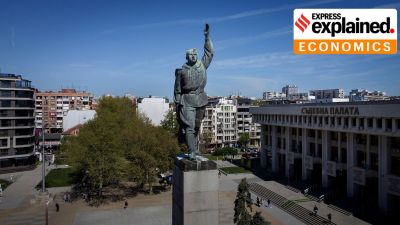Merry Christmas
It is Christmas again. The exceptional feature about this Christmas is that the whole world is celebrating the 2000th birth year of Jesus ...

It is Christmas again. The exceptional feature about this Christmas is that the whole world is celebrating the 2000th birth year of Jesus this year. Last year Pope John Paul II, the head of the Catholic Church, had declared this year as the Great Jubilee Year 2000, to highlight the existence of Christianity in the world.
But for the perception that quot;Christianity is a foreign religionquot;, the idea of declaring a Year of Christ in India mooted last year by the prime minister would have got some support. The Madhya Pradesh and Delhi governments, however, have declared it as the Year of Christ and the President formally inaugurated the Year of Christ in Delhi on December 20.
In this very column a few weeks ago there was an article, based on Holger Kersten8217;s book, Atilde;sup2;f40Atilde;sup3;Jesus Lived in India. Some years ago, while still in London, I had reviewed this book for a British Christian magazine and eventually prepared a radio programme for the BBC. From a Catholic priest8217;s perspective it was an exciting exercise to go through.
So there are two opposing views on the issue of Jesus and Christianity8217;sorigin. One could argue endlessly whether Christianity is a foreign religion or if, according to Kersten, Jesus lived, died and is buried in India, much like the current hot debate on the Aryan invasion and Harappan culture. But would that make for interesting Christmas reading?
Christmas means various things to different people. For children it is time for fun, receiving gifts from Santa Claus. For students and teachers, it means time off from school and college. For some, Christmas offers an opportune time for brisk sales. These, however, are all incidentals in which the exact import of Christmas gets completely lost.
When one finds that at the birth of Jesus, the message proclaimed by theangels to the shepherd in the field was, quot;Glory to God in the Highest and Peace to His people on Earthquot; Mt: 2:14 8212; the running theme of all the carol singing around the world 8212; one cannot help but be amused at the silly distinctions about Christianity being of Indian or foreign origin.
That the message of peace, love and joy was really universal, beyond theboundaries of one community and nation, is borne out by the fact that while the angels took care of informing the poorest, the simplest and uneducated folks like the shepherds in the field, there was a star in the sky to guide the three kings from the east to Bethlehem, who wanted to pay their homage to the new born king with precious gifts of gold, myrrh and frankincense Mt. 2:10-11.
Thus everyone was invited to participate in the event of the Saviour8217;s birth. Later in his life and missionary activity, Jesus continued, by his teaching and action, to spread His birthday message. So if there were serious discriminations in the Jewish community between men and women, between the priestly class and the lay people, between the leprosy patients and the healthy, between the righteous people and the sinners, between the haves and the haves not, Jesus tried to bridge the gap by bringing them all together. The message of Christmas, in a sense, was a very quot;communistquot; one, that is, to bring everyone on par with each other.
Within the Christian tradition the birth of Jesus is understood as a pure act of God8217;s love towards humanity. When Jesus was asked as to what was the most important commandment, he simply answered, quot;Love thy God with all thy heart, thy soul, thy strength and love thy neighbour as thyselfquot; Mark 12: 30-31. The commandment to love one8217;s neighbours thus takes the most prominent place in Christian life. But love for others need not be only a Christian monopoly. If love, particularly of those who lack it and of those trying to fill this world with hate, could be a driving force in human life, the world would be as joyful a place as the shepherd8217;s field where the message of Jesus8217; birth was first announced.
- 01
- 02
- 03
- 04
- 05































